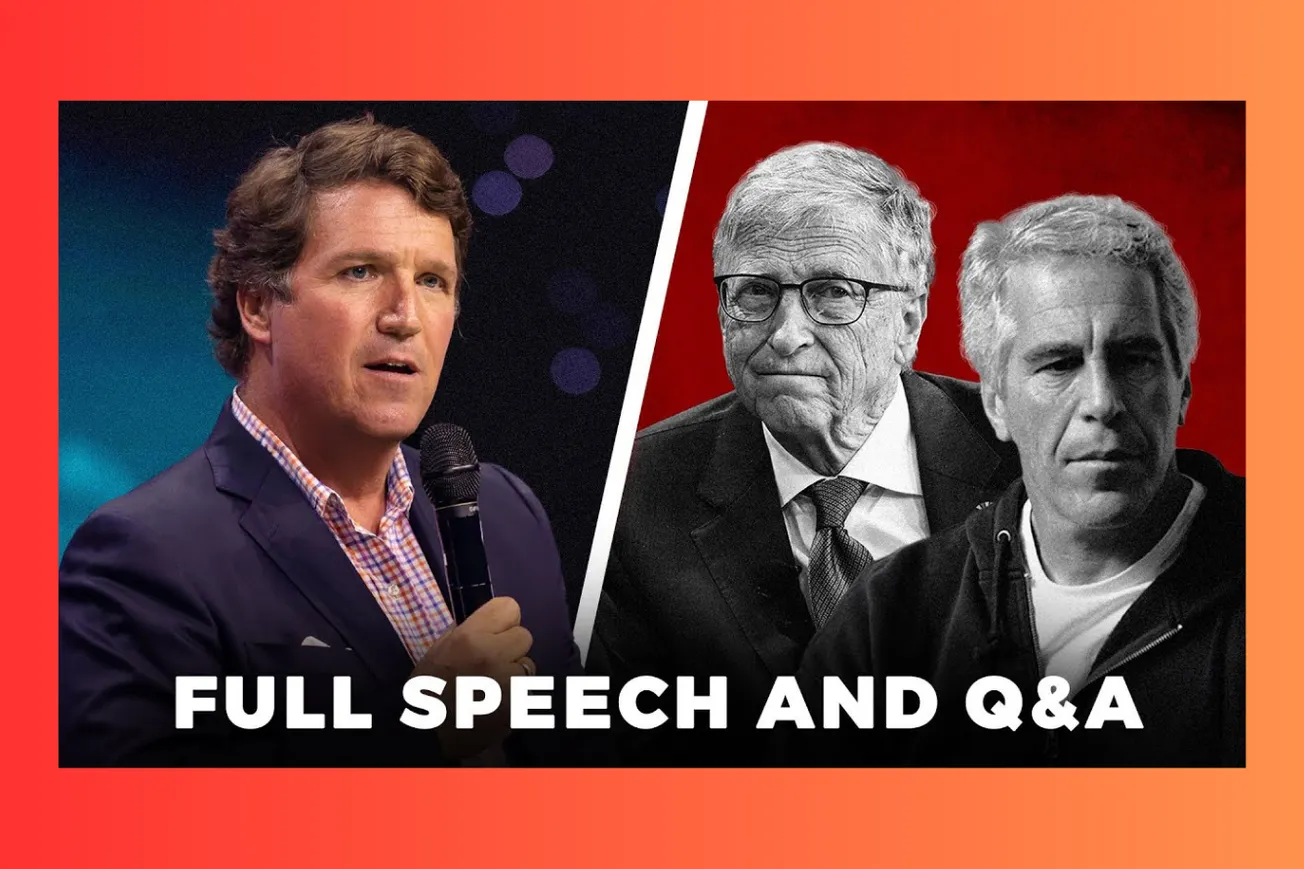Table of Contents
Tucker Carlson delivered a provocative speech calling for government accountability, transparency on the Epstein case, and prioritizing American citizens' concerns over foreign interests.
Key Takeaways
- Carlson condemned the "shut up racist" style of political discourse that dismisses legitimate questions without providing answers
- He argued the Jeffrey Epstein case represents broader frustration with elite impunity and lack of government transparency
- The speech questioned foreign intelligence connections to Epstein while calling for honest discussion about foreign influence
- Carlson highlighted economic concerns affecting young Americans, particularly housing affordability and credit card debt
- He criticized dual citizenship in government positions and called for America-first policies prioritizing citizens' immediate needs
- The speech emphasized the importance of citizenship as the unifying principle rather than identity politics
- Carlson argued for focusing on domestic problems like drug addiction and urban decay rather than foreign conflicts
Political Discourse and Democratic Accountability
- Carlson opened by rejecting Ben Shapiro's position that questioning the Epstein case is unimportant because "it happened a long time ago"
- He described voting for Trump specifically to oppose the "shut up racist" style of political argument that dismisses questions rather than answering them
- The speech emphasized that citizens deserve actual answers from officials rather than character attacks or dismissive responses
- Carlson argued this dismissive approach treats citizens "like a slave or an animal" rather than respecting their right to question authority
- He criticized the impulse toward censorship as stemming from the belief that ordinary citizens "don't deserve to speak because you're not fully human"
- The speech called for treating every human being with dignity in political discourse, emphasizing that "God created individuals" with inherent worth
The core of Carlson's critique centers on what he sees as a fundamental breakdown in democratic accountability. Rather than engaging with citizen concerns substantively, he argues that political leaders have adopted strategies of dismissal and character assassination. This approach, he contends, undermines the basic social contract between citizens and their representatives.
The Epstein Case as Symbol of Elite Impunity
- Carlson described the Jeffrey Epstein case as representing "the frustration of normal people watching a certain class of people get away with everything every single time"
- He claimed the cover-up began in 2007 when the original search warrant was "designed to protect Epstein" and prevent federal authorities from obtaining incriminating evidence
- The speech questioned how Epstein transformed from "a math teacher at the Dalton school in the late '70s with no college degree" to owning multiple aircraft and properties
- Carlson argued that Epstein's wealth accumulation lacks legitimate explanation, stating no one has "ever gotten to the bottom of that because no one has ever tried"
- He suggested the case exemplifies broader economic inequality where "some of the least impressive, most useless people who have no actual skills become billionaires"
- The speech connected Epstein's case to wider concerns about a system that rewards the "well-connected and super aggressive" rather than productive contributors
Carlson positioned the Epstein case not merely as an isolated scandal but as emblematic of systemic problems with elite accountability. He argued that the public's fascination with the case stems from deeper frustrations about economic inequality and the apparent immunity of wealthy elites from consequences that ordinary citizens would face.
Foreign Influence and Intelligence Operations
- Carlson directly stated his belief that "Jeffrey Epstein was working on behalf of intel services, probably not American"
- He questioned whether Epstein was "running a blackmail operation on behalf of foreign government" while noting that "every single person in Washington DC thinks that"
- The speech specifically mentioned Israel and Mossad, arguing there's "nothing wrong with saying that" and "nothing anti-semitic about saying" it
- Carlson compared questioning foreign intelligence operations to criticizing the CIA, which he argued doesn't make someone "disloyal American" or "anti-American"
- He criticized the reluctance to discuss potential foreign influence operations, arguing this creates "resentment" and "hate online" where people feel unable to ask legitimate questions
- The speech called for Israel to answer directly whether they conducted operations on American soil, stating "as long as we're sending you money" Americans have "an absolute right to know"
This section represented perhaps the most controversial aspect of Carlson's speech, as he directly challenged what he characterized as taboos around discussing foreign intelligence operations. He argued that open discussion of these possibilities is necessary for healthy democratic discourse, while positioning such questions as patriotic rather than bigoted.
Economic Crisis and Generational Decline
- Carlson highlighted the housing affordability crisis, noting that his children and other young adults "can't afford houses with full-time jobs at like 27, 28"
- He argued that 35-year-olds with "really good jobs can't afford a house unless they stretch and go deep into debt"
- The speech connected homeownership to political stability, arguing that "if people don't own things, they don't feel ownership of the country they're in"
- Carlson emphasized that housing is essential for family formation, stating "it's really hard to have a family without a house"
- He criticized high credit card interest rates as "the single biggest cause of human suffering that I'm aware of in the United States"
- The speech called for political leadership to assign "moral value" to different types of wealth accumulation, particularly criticizing predatory lending practices
Carlson's economic critique centered on generational decline and the erosion of middle-class stability. He argued that current economic conditions prevent young Americans from achieving basic milestones like homeownership and family formation that previous generations took for granted.
Immigration Policy and National Sovereignty
- Carlson expressed strong opposition to any form of amnesty for undocumented workers, calling it "the most grotesque thing I've ever heard"
- He claimed there are "60 million illegal aliens in the country" and argued the nation "bears no resemblance to the country I grew up in"
- The speech criticized providing "housing vouchers and free education and free cell phones and plane tickets" to undocumented immigrants while citizens face legal consequences
- Carlson argued this creates unfairness where people "not only are they not getting punished for breaking American law, as I would and have, they're getting rewarded for it"
- He connected immigration policy to broader concerns about citizenship meaning, arguing it undermines the value of legal citizenship
- The speech called for prioritizing deportation over amnesty, reflecting his broader America-first policy preferences
Dual Citizenship and Government Service
- Carlson argued that serving in foreign militaries should result in immediate loss of American citizenship, specifically mentioning Americans who served in the IDF
- He quoted the New Testament principle that "no man can serve two masters" to argue against dual citizenship in government
- The speech emphasized the importance of total commitment to America, describing his personal decision to remain despite the country's problems
- Carlson criticized the presence of "foreign flags in the Congress" as outrageous and contrary to American principles
- He called for prohibiting dual citizens from serving in government positions, arguing this should be a "baseline requirement"
- The speech connected dual citizenship concerns to broader questions about divided loyalties among political elites
This section reflected Carlson's nationalist perspective on citizenship and government service, arguing that divided loyalties compromise effective representation of American interests.
Media Criticism and Institutional Distrust
- Carlson criticized Fox News for running pieces dismissing Epstein questions as coming from "nutcase with an unhappy personal life"
- He condemned media figures who insult questioners rather than addressing substantive concerns about government accountability
- The speech argued against allowing anyone to "get away with insulting you instead of answering a legitimate question"
- Carlson described widespread "rage online" resulting from officials ignoring citizen concerns and "call them names rather than answering their questions"
- He emphasized the importance of physical reality over media narratives, describing himself as "a physicalist" who believes in "things I can touch and smell"
- The speech called for citizens to determine their own priorities rather than accepting media-defined issues as most important
Common Questions
Q: What does Carlson mean by "shut up racist" political discourse?
A: He describes a style of argument that dismisses legitimate questions by attacking the questioner's character rather than providing substantive answers.
Q: Why does Carlson consider the Epstein case particularly important?
A: He views it as symbolic of elite impunity and government unwillingness to provide transparency on matters of public concern.
Q: What is Carlson's position on foreign influence investigations?
A: He argues Americans have the right to know if foreign governments conducted operations on US soil, especially given American financial support.
Q: How does Carlson connect economic inequality to political instability?
A: He argues that when young people cannot achieve basic milestones like homeownership, they lose stake in the political system.
Q: What is Carlson's stance on dual citizenship in government?
A: He opposes it entirely, arguing that government officials must have undivided loyalty to America and should lose citizenship for foreign military service.
Carlson's speech represents a populist critique of American political discourse and institutions, emphasizing citizen concerns over elite priorities. His arguments reflect broader tensions about government accountability, foreign influence, and economic inequality in contemporary American politics.









